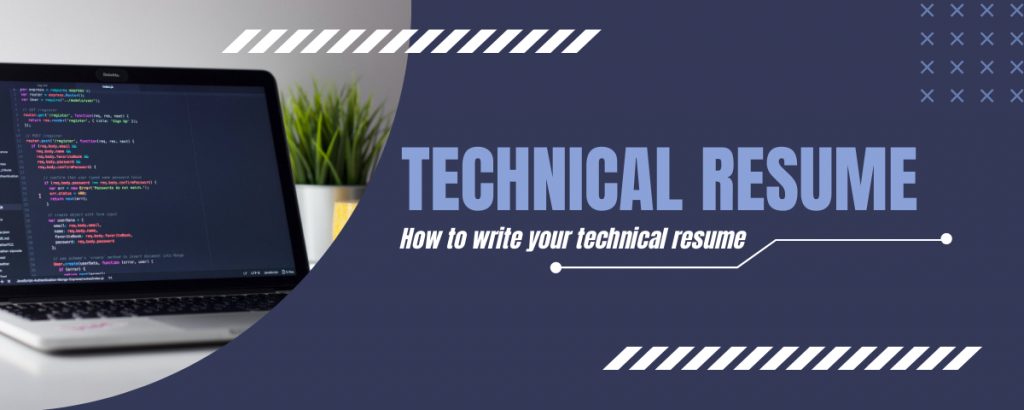Writing a Technical Resume

How is a tech resume different from a regular resume? A technical resume is a list of your education, skills, job/project experience and that highlights your ability to perform in a technical role. There is a very big focus on hard skills such as the ability to code, create databases, and do many other highly technical tasks.
General Tips:
- It is important to remember that a resume is a subjective document and there is no one “correct” way to craft one.
- One of the biggest things to keep in mind is that the document is consistent, clean, and correct (remember the three C’s!).
- Try to keep it to one page if you are an undergraduate student. The average employer looks at a resume for 20-30 seconds.
- It is very important to keep in mind that each position, whether that is a full-time role or internship, is going to have different requirements. With this in mind, it is important to tailor your resume to the exact jobs for which you are applying, even if that means changing a few words. Additionally, it can be helpful to even match some of the verbiage of your resume to a job posting, however, never falsify any information or write what was written verbatim from the posting.
Using ChatGPT/GenAI for your resume:
- Should you use ChatGPT to write your resume?
- The short answer is, it depends. ChatGPT can be useful for creating a “draft” of your resume. Then, make sure to have a personal and professional review of it to ensure the accuracy of the information. A recent survey suggested that 9 out of 10 companies prefer candidates who have ChatGPT skills. Check out this article from Dice, for more insight into using AI to develop a solid tech resume.
- Double-check for inaccuracies.
- It is not a perfect technology, so there are likely errors/hallucinations on your resume. Make sure to review your document for any potentially incorrect data.
- Prompts can be useful in getting started.
- Using prompts such as “Write a resume for a [TITLE] based on this job description. [Copy/paste the job description.], and “Write a resume based on this [TITLE] position at [COMPANY] and include bullet point achievements that show impact and metrics. [Copy/paste the job description.]”
Core sections: Even though you should curate your resume to be specific to the roles that you are interested in, there are a few key elements that a tech resume should have, in order:
- Contact Information: Make sure that you include an email that you check frequently and your cell phone number, at the bare minimum. The optional information you can include your physical address (city and state are fine), a customized LinkedIn URL (strongly recommended), and your GitHub repository link. Take a look at this document for more information about GitHub.
- Education: List the name of your university (The University of North Carolina at Chapel Hill), degree type (BA or BS), your major (s), minor (s), month and year of graduation, any relevant honors and awards (Dean’s List, etc.), and GPA if it is 3.0 or above. If you are a sophomore or younger, you can leave your high school information on your resume until you become a junior or go over one page. Also, list any relevant coursework here that might be helpful in an internship or full-time role (Ex: Data Structures and Algorithms).
- Skills: This is one of the most important sections on a tech resume. You will list your “hard” tech skills here such as, but not limited to: programming languages, operating systems, frameworks, and foreign languages. This is typically placed beneath “Education” on the resume since the two often go hand-in-hand.
- Relevant Experience: This section is going to look different for every candidate, depending on years of studying computer science as well as other factors. However, if you have had an internship or job that was related to tech in some way, then this is where you would list it here. You also want to use bullet points as your descriptions within each experience listed beginning each with what we call “action verbs“. See the tech resume sample for more.
- Projects: Having a “Projects” section on your resume, particularly as a student, is incredibly important. This is where you can showcase class projects, others from hackathons, or personal ones. Like with your experiences, you want to use bullet points here as well. Mention programming languages, or other software used in this section.
- Volunteer/Leadership/Other Experience: If you are involved with clubs and/or have any leadership roles, this is the section to list those. Additionally, if you have volunteered on- or off-campus, this is the place to put that experience as well.
Formatting Your Resume:
- Fonts should be all consistent, somewhere between 10-11.5pt. is standard.
- Dates should be the most recent activity first
- Generally should fit 1 page. If it’s difficult to fit it into one page, see if your bullet points (descriptions of your activity) can be more concise to save space.
Other Information:
- Personal Summary: This section becomes more important as you grow into your career, but it can be helpful to use as a summary of your major accomplishments and a brief snapshot of your career. This is recommended for seniors or graduate students at the earliest.
- Quantify (if you can): It can be helpful to show real data and numbers that you worked with, as it builds credibility with recruiters and hiring managers. You have already given context to your skills and experiences, so now take it to another level and elaborate on your successes. (Ex: increased SEO ranking by 35%).
Want your resume reviewed? Make an appointment with a CS Career Assistant!
Additional Resources:
Technical Resume Writing: Tips and Tricks
Resume Writing Tips from Google
